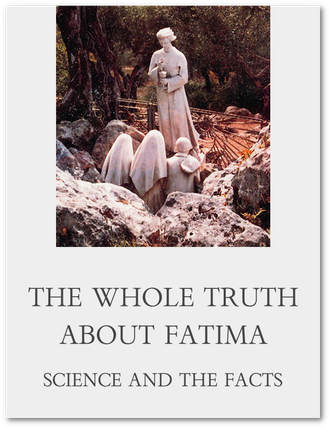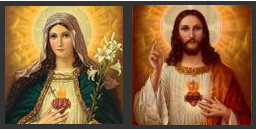389 Q. Which are the chief commandments of the Church? A. The chief commandments of the Church are six:
1. To hear Mass on Sundays and holy days of obligation. 2. To fast and abstain on the days appointed. 3. To confess at least once a year. 4. To receive the Holy Eucharist during the Easter time. 5. To contribute to the support of our pastors. 6. Not to marry persons who are not Catholics, or who are related to us within the third degree of kindred, nor privately without witnesses, nor to solemnize marriage at forbidden times.
390 Q. Is it a mortal sin not to hear Mass on a Sunday or a holy day of obligation? A. It is a mortal sin not to hear Mass on a Sunday or a holy day of obligation, unless we are excused for a serious reason. They also commit a mortal sin, who, having others under their charge, hinder them from hearing Mass, without a sufficient reason.
"Serious reason"—that is, a very good reason, such as sickness, necessity of taking care of the sick, great danger of death, etc. Some persons when they go to the country in the summer believe themselves excused from hearing Mass because the church is a little further from them or the Mass at more inconvenient times than in the city. When they are in the country they are bound by the same obligations as the Catholics who live in that parish the whole year round, and they must go to Mass as these do, even if it is more inconvenient than in the city. Persons who have it in their power to select their own summer resort, should not, without great necessity, select a place where there is no Catholic church, and where they will be deprived of Mass and the Sacraments for several months, and where there is danger of their dying without the Sacraments. Some excuse themselves from going to Mass because they are too tired to rise in the morning. They should be ashamed to give such an excuse. Was our Blessed Lord not tired when He carried His Cross? He was tired, for He fell under it several times. And where was He going? To Calvary, to offer up the bloody sacrifice of the Cross for you. Will you plead fatigue as an excuse when you come to be judged by Him? Others again have a great habit of coming late for Mass. No matter at what hour the Mass may be, they will always be late; and I am afraid these persons will also be too late to enter Heaven. By coming late they show disrespect to Our Lord and distract others; and to avoid doing so, they should, when late, take a place in the rear of the church. When you are very late for one Mass, you should wait for the next—at least, for as much of the next as you did not hear in the first. You should not, however, begrudge a little extra time to God. To hear Mass properly, you should be in your place a few minutes before the priest comes out, and make up your mind what blessing you will ask, or for what intention you desire to hear the Mass.
"Having others under their charge." Some parents are very careless about their children attending Mass, especially on holy days. Now, they must remember that in such neglect the sin will be theirs as well as the children's. Again, masters and mistresses do not at times give their workmen and servants sufficient opportunity to hear Mass, above all on holy days. All masters and mistresses must remember that they are bound not only to give their servants an opportunity to hear Mass, but they are bound as far as they conveniently can to see that they embrace the opportunity, just as they should see to their children in such matters. Catholics having in their employ others, such as engineers, drivers, conductors, etc., must make some arrangement between their men by which they will be able to attend Mass on Sundays and holy days. The same holds good for companies and corporations having under their charge a large force of men who are obliged by circumstances to work on Sundays.
*391 Q. Why were holy days instituted by the Church? A. Holy days were instituted by the Church to recall to our minds the great mysteries of religion and the virtues and rewards of the saints.
For just the same reason that the government has legal holidays. What would the people of this country know or think at the present time about the Declaration of Independence, and all connected with it, if they did not celebrate from childhood every year, on the Fourth of July, the great day on which their forefathers claimed to be free and independent from the nation that was persecuting them? The Fourth of July keeps alive in our memory the struggles of our ancestors of one hundred years or more ago—their great battles, their sufferings and triumph, the blessings they secured for us, and for which we praise them. In like manner, the feast of the Resurrection of Our Lord keeps us in mind of the sad condition in which we were before Our Lord redeemed us, and how He liberated us from the slavery of the devil and secured for us so many wonderful blessings. Again, what would we remember about George Washington if we did not celebrate his birthday? That holiday keeps before our minds the life and actions of that great man and all he did for our benefit. So, too, when we celebrate every year the feast of a saint in the Church, it keeps before our minds his works and all that he did for God and the Church, and makes us anxious to imitate his virtues. On every day in the year the Church honors some mystery of our holy faith or some saint by saying Mass all over the world in honor of the feast, and by obliging the priests and bishops to say the divine office for the same purpose. The feast-day of a saint is generally the day on which he died; because that is considered the day on which he entered into Heaven—the day on which he was born into the new world.
The "divine office" is a collection of prayers, hymns, lessons, and psalms which every priest and bishop must read every day of his life. As it is said each day in honor of some particular mystery or saint, the greater part of it differs for each day. The prayers are to God, asking some grace or blessing in honor of the saint—generally such graces as were granted to the saint. The hymns are in the saint's honor; the lessons are parts of the Holy Scripture, or an account of the saint's life; and the psalms are those beautiful poems that King David composed and sang to God. The divine office is the prayer of the universal Church for its children, and if a priest neglects to say it he commits a mortal sin. It takes about an hour to say the whole divine office, but it is not intended to be said all at once. It is so divided that it is said at three times in the day. The part called "Matins" and "Lauds" is said very early in the morning and before Mass. The part called "Little Hours" is said later in the day; and the part called "Vespers" and "Compline" is said in the afternoon. See, therefore, how anxious the Church is for the good of its children, when it makes its bishops, priests, and religious pray daily for all the faithful, and send up in one voice the same prayer to the throne of God.
*392 Q. How should we keep the holy days of obligation? A. We should keep the holy days of obligation as we should keep the Sunday.
393 Q. What do you mean by fast-days? A. By fast-days I mean days on which we are allowed but one full meal.
According to the traditional Catholic method of fasting, one may eat "one full meal" each day with meat included, plus two smaller meatless meals, both of which together do not equal the one full meal. No eating between meals is allowed, although drinking beverages such as coffee and tea are allowed and are not considered to break the fast. (Milk, juice, and soft drinks are also considered not to break the fast, although they are in fact foods and mitigate the effects of the fast and work contrary to its intent because they satisfy one's hunger to some extent, since they have food value.) They, therefore, who follow the above regulations obey the Catholic method of fasting. Today the prescribed days of fast for the whole Church are Ash Wednesday and Good Friday (these are also days of abstinence). However the Church today says that the meaning of the law of fasting during Lent remains, although the extent of the obligation has been changed. In other words, Lent remains as a season of penance in the Church, but how it is to be observed is greatly up to the individual, though no one may think himself excused from all penance whatsoever, and those who are in the fasting age group should still practice the Church's form of fasting, since fasting is a primary and very efficacious form of penance.
Those who, for sufficient reasons, are excused from the obligation of fasting, are not on that account freed from the law of abstinence, for all who have reached their fourteenth birthday are bound to abstain from flesh-meat on days when it is forbidden—Ash Wednesday and the Fridays of Lent. The following persons are excused from fasting: (1) those who are not yet twenty-one or who have begun their sixtieth year (from their 59th birthday onward); (2) those whose infirmity, condition, or occupation renders it impossible or dangerous for them to fast. If you think you should be excused from fasting or abstaining, state your reasons to your confessor and ask his advice. On a fast-day, therefore, you have to look both to the quantity and the kind of food, while on a day of abstinence—as the Fridays in Lent other than Good Friday—you have to look only to the kind.
394 Q. What do you mean by days of abstinence? A. By days of abstinence I mean days on which we are forbidden to eat flesh-meat, but are allowed the usual amount of food.
395 Q. Why does the Church command us to fast and abstain? A. The Church commands us to fast and abstain in order that we may mortify our passions and satisfy for our sins.
"Mortify our passions," keep our bodies under control, do bodily penance. Remember it is our bodies that generally lead us into sin; if therefore we punish the body by fasting and mortification, we atone for the sin, and thus God wipes out a part of the temporal punishment due to it.
*396 Q. Why does the Church command us to abstain from flesh-meat on Ash Wednesday and the Fridays of Lent and to abstain from flesh-meat or do some other chosen penance on the other Fridays of the year? A. The Church commands us to abstain, from flesh-meat on Ash Wednesday and the Fridays of Lent and to abstain from flesh-meat or do some other chosen penance on the other Fridays of the year in honor of the day on which Our Saviour died.





